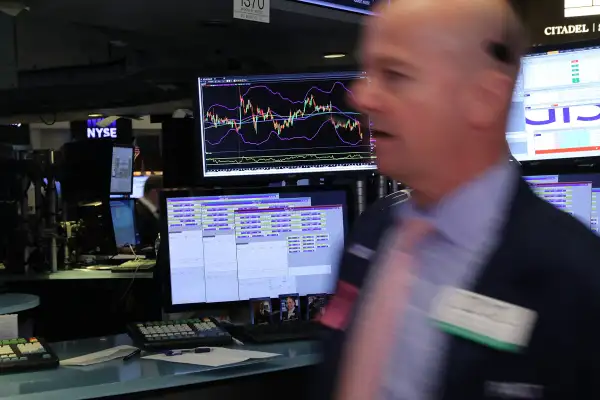Here's Why the Stock Market Is Dropping — and What You Should Do About It Now
Money is not a client of any investment adviser featured on this page. The information provided on this page is for educational purposes only and is not intended as investment advice. Money does not offer advisory services.

On Thursday, the Dow dropped 546 points. Following an even more tumultuous Wednesday, the index has now plunged nearly 1,380 points in just two days. The stock market, which seemed to be humming along with the rest of the U.S. economy, may look wobbly.
Sudden stock market drops can be scary, but don't panic.
While 1,300 points sounds like a lot, the Dow Jones Industrial Average began Wednesday at more than 26,400. So the decline ultimately represented a loss of just over 5%. In other words, the stock market is back where it was in roughly mid-July.
If you are a broadly diversified buy-and-hold investor -- as you should be -- your U.S. stock holdings are still likely up slightly on the year.
Still, to the extent possible it's important to understand what's happening on Wall Street, including the basics for why the stock market dropped. While you shouldn't regard Wednesday's move a market shift, you might want to use this moment as an opportunity for a gut-check.
Here's what you need to know and what you should do.
Why Did the Stock Market Drop?
As often occurs, after a big market move, Wall Street traders offered up several explanations for what happened to the stock market on Wednesday.
One has to do with President Trump's trade war with China. While the Trump administration has been talking about China for months, it upped the ante in late September by slapping a 10% duty on $200 billion worth of Chinese consumer goods. The China tariffs are expected to jump to 25% in January. The trade stand-off could hurt both the U.S. and Chinese companies, by raising production costs and crimping consumer spending. As the U.S. stock market dropped this week, China's two main stock markets were hit even harder, with Shenzhen tumbling 6.5% and Shanghai down 5.2%.
The trade war wasn't the only thing investors were reacting to, however. Also in late September, the U.S. Federal Reserve raised interest rates for the third time this year. Those moves are meant to head off inflation, which has been finally beginning to tick up as the U.S. economy gains steam. Since the Fed's rate hike, 10-year Treasury yields, which spent much of year below 3%, have jumped to nearly 3.2%. Higher interest rates hurt stocks by making bonds a comparatively more attractive investment, and by making it more expensive for companies to borrow and invest.
What to Do About the Stock Market Drop Today
The correct reaction to a one-day market move is, of course, to do nothing at all. While it's possible to identify some of the political and economic factors Wall Street traders were reacting to, no one knows where the market will go from here.
After all, it was only in February when the Dow plunged 1,175 points in a single day -- the biggest point drop in history. Soon after that, the stock market quickly recovered and went on to new record highs.
What's more, while traders partly attribute the latest Dow drop to rising interest rates, that should be good news in the long run. Don't forget: The Federal Reserve is acting because the economy is so strong it's in danger of overheating. In other words, all this could well turn out to be another blip.
Still, while it's impossible to predict what significance -- if any -- the stock market drop this week will have, you should be aware that sooner or later stocks will face a major sell-off. The current bull market -- now nine years old -- is the oldest in history. Investing pros have been warning for months that the U.S. market is overvalued. Indeed, the S&P 500 is trading at 33 times its average long-term earnings -- a level higher than at any time in history, save right before the 2000 dot-com crash and 1929. (It may be no accident that U.S. tech stocks, which had been leading the market, were among the hardest hit Wednesday, declining nearly 5%.)
Are you really feeling a jolt of panic right now? The answer should be "no." But if is "yes," then perhaps you should consider selling some of your stock holdings and replacing them with bonds.
That's not because the latest sell-off is a sure-fire sign the next bear market is upon us. It's because when the bear does finally come, you'll likely feel the same sense of panic. Therefore, it's better to make that move now, when stocks are still within a few percentage points of record highs, rather than later when they've dropped 10%, 20%, or more.
